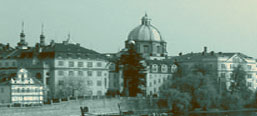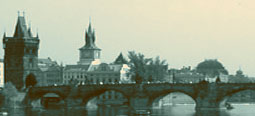Biography
Vaclav
Havel was born to an influential bourgeoisie family on October
5th, 1936 in Prague. As the son of a wealthy restaurant
owner, Havel's childhood influences determined his future
as a writer and a politician. His maternal grandfather was
a Czech diplomat, and his paternal grandfather built the
Lucerna Ballroom. Also, his uncle was the founder of the
Barrandov Film Studios.
Havel's
family was one of the most wealthy and influential in Prague.
But the family lost their wealth and property when a Moscow-backed
coup seized power in 1948. Denied a higher education, Havel
worked as an apprentice to a lab technician and took night
classes at grammar schools for a high school degree. When
he was denied entrance to the liberal arts colleges for
political reasons, Havel studied economics at the Czechoslovakian
University of Technology. Upon graduating in 1957, he served
in the army for two years, during which he found an interest
in drama.
Afterwards,
Havel worked as a stagehand at Prague's ABC Theater. The
Theater on the Balustrade staged several of his plays that
reflect the Czech society and often criticized the Communist
government. During this time, Havel met Olga Splichalova,
whom he married in 1964. Olga also worked in the Theater
on the Balustrade and shared Havel's vision of a better
Czechoslovakia.
During
the period of the Prague Spring,
from 1962 to 1968, artists were allowed to express themselves
openly and many of Havel's plays were performed. After the
Summer of 1968,
Havel worked in a brewery and began publishing articles
of the totalitarian control of the Soviet Union and of that
of the Communist regime in Czechoslovakia. As a result,
Havel's writings and plays were banned, and he declined
the offer to leave Czechoslovakia. In 1975, he was imprisoned
for writing a criticizing letter to the president, Gustav
Husak. However, illegal copies traveled around Central Europe
and aroused the people. In 1977, Havel and others created
Charter 77, but they were
arrested before it couldbe distributed. Havel was rearrested
again upon writing "Power of the Powerless" after
this incident. From 1977 to 1989, he was jailed for founding
the Commitee for the Defense of the Unjustly Persecuted.
During his imprisonment, Havel wrote many letters to Olga,
who supported him fully in his political movements. In 1989,
the Civic Forum, another of Havel's founding groups, gained
support of millions of Czechs. On December 29, 1989, the
Communist Regime ended with the Velvet
Revolution and Havel was elected president of Czechoslovakia.
Through
old ethnic divisions, the nation split into Slovakia and
the Czech Republic in 1992. The split was called the Velvet
Divorce. Havel resigned
his presidency rather than signing the Declaration of Slovakian
Independence.
In
1996, Olga sadly died of cancer. After discovering that
he had cancer himself, Havel had several surgeries to remove
two small tumors and half of his right lung. During this
period Havel met Dagmar Veskrmova, who became his second
wife. Though his health was never the same since, this did
not slow him down. In 1998, Havel was reelected as president.
Not only did he establish the Czech Republic internationally,
but he also tried to create a democratic government. In
February 2, 2003, Vaclav Havel retired from Czech politics.





